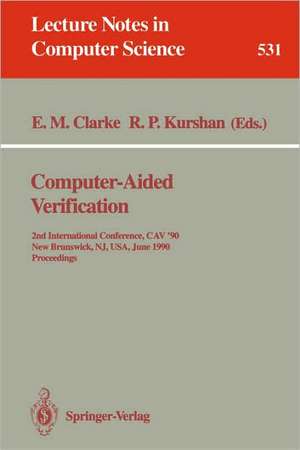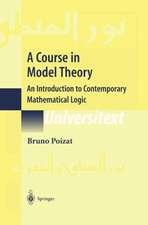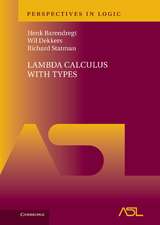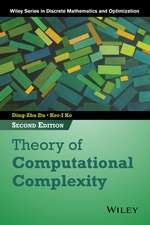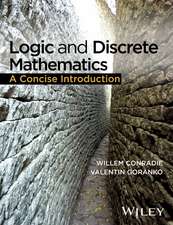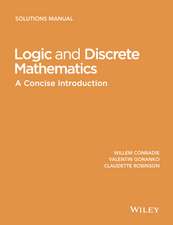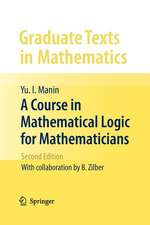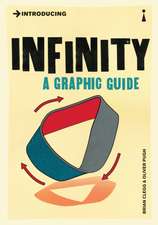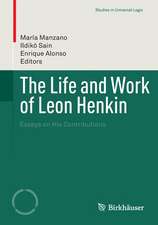Computer-Aided Verification: 2nd Internatonal Conference, CAV '90, New Brunswick, NJ, USA, June 18-21, 1990. Proceedings: Lecture Notes in Computer Science, cartea 531
Editat de Edmund M. Clarke, Robert P. Kurshanen Limba Engleză Paperback – 2 oct 1991
Din seria Lecture Notes in Computer Science
- 20%
 Preț: 1061.55 lei
Preț: 1061.55 lei - 20%
 Preț: 307.71 lei
Preț: 307.71 lei - 20%
 Preț: 438.69 lei
Preț: 438.69 lei - 20%
 Preț: 645.28 lei
Preț: 645.28 lei -
 Preț: 410.88 lei
Preț: 410.88 lei - 15%
 Preț: 580.46 lei
Preț: 580.46 lei - 17%
 Preț: 427.22 lei
Preț: 427.22 lei - 20%
 Preț: 596.46 lei
Preț: 596.46 lei -
 Preț: 381.21 lei
Preț: 381.21 lei - 20%
 Preț: 353.50 lei
Preț: 353.50 lei - 20%
 Preț: 1414.79 lei
Preț: 1414.79 lei - 20%
 Preț: 309.90 lei
Preț: 309.90 lei - 20%
 Preț: 583.40 lei
Preț: 583.40 lei - 20%
 Preț: 1075.26 lei
Preț: 1075.26 lei - 20%
 Preț: 310.26 lei
Preț: 310.26 lei - 20%
 Preț: 655.02 lei
Preț: 655.02 lei - 20%
 Preț: 580.93 lei
Preț: 580.93 lei - 20%
 Preț: 340.32 lei
Preț: 340.32 lei - 15%
 Preț: 438.59 lei
Preț: 438.59 lei - 20%
 Preț: 591.51 lei
Preț: 591.51 lei - 20%
 Preț: 649.49 lei
Preț: 649.49 lei - 20%
 Preț: 337.00 lei
Preț: 337.00 lei -
 Preț: 449.57 lei
Preț: 449.57 lei - 20%
 Preț: 607.39 lei
Preț: 607.39 lei - 20%
 Preț: 1024.44 lei
Preț: 1024.44 lei - 20%
 Preț: 579.30 lei
Preț: 579.30 lei - 20%
 Preț: 763.23 lei
Preț: 763.23 lei - 20%
 Preț: 453.32 lei
Preț: 453.32 lei - 20%
 Preț: 575.48 lei
Preț: 575.48 lei - 20%
 Preț: 585.88 lei
Preț: 585.88 lei - 20%
 Preț: 825.93 lei
Preț: 825.93 lei - 20%
 Preț: 763.23 lei
Preț: 763.23 lei - 17%
 Preț: 360.19 lei
Preț: 360.19 lei - 20%
 Preț: 1183.14 lei
Preț: 1183.14 lei - 20%
 Preț: 340.32 lei
Preț: 340.32 lei - 20%
 Preț: 504.57 lei
Preț: 504.57 lei - 20%
 Preț: 369.12 lei
Preț: 369.12 lei - 20%
 Preț: 583.40 lei
Preț: 583.40 lei - 20%
 Preț: 343.62 lei
Preț: 343.62 lei - 20%
 Preț: 350.21 lei
Preț: 350.21 lei - 20%
 Preț: 764.89 lei
Preț: 764.89 lei - 20%
 Preț: 583.40 lei
Preț: 583.40 lei -
 Preț: 389.48 lei
Preț: 389.48 lei - 20%
 Preț: 341.95 lei
Preț: 341.95 lei - 20%
 Preț: 238.01 lei
Preț: 238.01 lei - 20%
 Preț: 538.29 lei
Preț: 538.29 lei
Preț: 393.74 lei
Nou
Puncte Express: 591
Preț estimativ în valută:
75.35€ • 78.19$ • 62.98£
75.35€ • 78.19$ • 62.98£
Carte tipărită la comandă
Livrare economică 17-31 martie
Preluare comenzi: 021 569.72.76
Specificații
ISBN-13: 9783540544777
ISBN-10: 3540544771
Pagini: 392
Ilustrații: XIV, 378 p.
Dimensiuni: 155 x 235 x 21 mm
Greutate: 0.55 kg
Ediția:1991
Editura: Springer Berlin, Heidelberg
Colecția Springer
Seria Lecture Notes in Computer Science
Locul publicării:Berlin, Heidelberg, Germany
ISBN-10: 3540544771
Pagini: 392
Ilustrații: XIV, 378 p.
Dimensiuni: 155 x 235 x 21 mm
Greutate: 0.55 kg
Ediția:1991
Editura: Springer Berlin, Heidelberg
Colecția Springer
Seria Lecture Notes in Computer Science
Locul publicării:Berlin, Heidelberg, Germany
Public țintă
ResearchCuprins
Temporal logic model checking: Two techniques for avoiding the state explosion problem.- Automatic verification of extensions of hardware descriptions.- Papetri : Environment for the analysis of PETRI nets.- Verifying temporal properties of sequential machines without building their state diagrams.- Formal verification of digital circuits using symbolic ternary system models.- Vectorized model checking for computation tree logic.- to a computational theory and implementation of sequential hardware equivalence.- Auto/autograph.- A data path verifier for register transfer level using temporal logic language Tokio.- The use of model checking in ATPG for sequential circuits.- Compositional design and verification of communication protocols, using labelled petri nets.- Issues arising in the analysis of L.0.- Automated RTL verification based on predicate calculus.- On using protean to verify ISO FTAM protocol.- Quantitative temporal reasoning.- Using partial-order semantics to avoid the state explosion problem in asynchronous systems.- A stubborn attack on state explosion.- Using optimal simulations to reduce reachability graphs.- Using partial orders to improve automatic verification methods.- Compositional minimization of finite state systems.- Minimal model generation.- A context dependent equivalence relation between kripke structures.- The modular framework of computer-aided verification.- Verifying liveness properties by verifying safety properties.- Memory efficient algorithms for the verification of temporal properties.- A unified approach to the deadlock detection problem in networks of communicating finite state machines.- Branching time regular temporal logic for model checking with linear time complexity.- The algebraic feedback product of automata.- Synthesizing processes and schedulers from temporal specifications.- Task-driven supervisory control of discrete event systems.- A proof lattice-based technique for analyzing liveness of resource controllers.- Verification of a multiprocessor cache protocol using simulation relations and higher-order logic (summary).- Computer assistance for program refinement.- Program verification by symbolic execution of hyperfinite ideal machines.- Extension of the Karp and miller procedure to lotos specifications.- An algebra for delay-insensitive circuits.- Finiteness conditions and structural construction of automata for all process algebras.- On automatically explaining bisimulation inequivalence.
